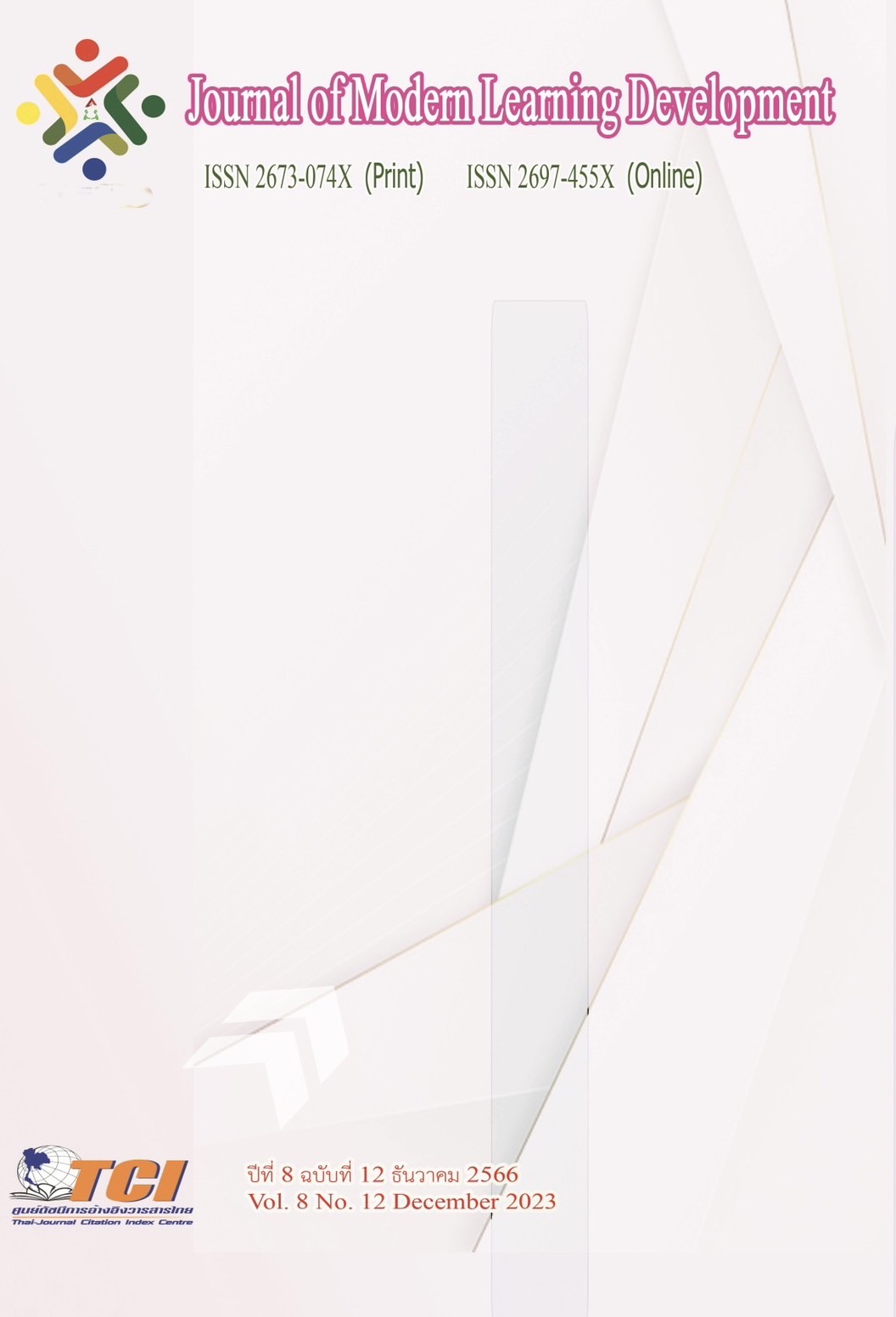Developing a Framework of Self-Leadership for Undergraduate Students in Thailand
Main Article Content
Abstract
Self-leadership is a topic applied for higher education today, since self-leadership could bring positive growth, develop, and change for students in higher education; Thailand needs to develop social changes successfully, thus the idealistic future leaders need to possess calm, wise and intellectual mindfulness to complex social issues; furthermore, Thailand can provide sufficient resources and platforms to develop self-leadership for students in higher education; thus, the researcher aimed to propose the framework and contribute the development of self-leadership in Thailand; the research was quantitative analysis by the five objectives: 1) to find what levels of self-leadership for undergraduate students in Thailand; 2) to find what levels of activities can assist to self-leadership for undergraduate students in Thailand; 3) to determine whether is significant difference between students’ demographics and self-leadership for undergraduate students in Thailand; 4) to determine whether is relationship between leadership activities and self-leadership for undergraduate students in Thailand; 5) to propose suitable framework of self-leadership for undergraduate students in Thailand. the research conducted random sampling and online questionnaire as the tool of data collection; there were 400 valid data as the analytical data; respondents are undergraduate students from three representative universities in Bangkok, Thailand; the research including the following findings: 1) dimensions of self-leadership suitable for students in higher education in Thailand: outlook, self, action, and reflection; 2) five kinds of activities assist to self-leadership suitable for students in higher education in Thailand: keep energy, good communication, self-regulation, undertake responsibility, and smart decision-making; 3) there were not significant difference between demographics of students and self-leadership for undergraduate students in Thailand (p>.05) ; 4) there were significant relationship between activities and self-leadership for undergraduate students in Thailand (p<.05); 5) the five scholars offered approved results to the validation on the framework (≥0.60), thus, the framework may assist to develop self-leadership for undergraduate students; furthermore, the framework suggested stakeholders can consider organize educational platforms like lectures, seminars, learning programs to students in higher education in Thailand, they can conduct the five activities to assist to enhance self-leadership for students in Thai higher education; in conclusion, by the empirical research, the framework could assist to develop self-leadership for undergraduate students in Thailand, practitioners might adjust the context of the framework in their reality.
Article Details
References
Asbari, M., Novitasari, D., Purwanto, A., Fahmi, K., & Setiawan, T. (2021). Self-leadership to innovation: The role of knowledge sharing. International Journal of Social and Management Studies, 2(5), 21-36.
Chanthago, P. J., & Jantaragaroon, C. (2020). Development of a learning school in Wat Srichan School, Khon Kaen Province: A participatory action research. International Journal of Higher Education, 9(1), 11-21.
Durnali, M. (2020). The effect of self-directed learning on the relationship between self-leadership and online learning among university students in Turkey. Tuning Journal for Higher Education, 8(1), 129-165.
Gambill, T., & Carbonara, S. (2021). Getting It Right When It Matters Most: Self-Leadership for Work and Life. Business Expert Press.
Gan, T. Y., Beevi, Z., Low, J., Lee, P. J., & Hall, D. A. (2022). Developing Future-Ready University Graduates: Nurturing Wellbeing and Life Skills as Well as Academic Talent. Frontiers in Psychology, 13, 559.
Harari, M. B., Williams, E. A., Castro, S. L., & Brant, K. K. (2021). Self‐leadership: A meta‐analysis of over two decades of research. Journal of Occupational and Organizational Psychology, 94(4), 890-923.
Hsieh, T. Y., & Kong, H. (2023). Positive Influence: The First and Last Mile of Leadership. World Scientific.
Kumar, A. (2022). Personal, Social, Academic and Career Development in Higher Education: SOARing to Success. Taylor & Francis.
Knotts, K., Houghton, J. D., Pearce, C. L., Chen, H., Stewart, G. L., & Manz, C. C. (2022). Leading from the inside out: a meta-analysis of how, when, and why self-leadership affects individual outcomes. European Journal of Work and Organizational Psychology, 31(2), 273-291.
Maksum, A., Safitri, D., Ibrahim, N., Marini, A., & Wahyudi, A. (2020). Impact of self-leadership on student critical thinking. International Journal of Innovation, creativity and change, 12(3), 284-304.
Maya, İ., & Uzman, E. (2019). The Predictive Power of University Students' Self-Leadership Strategies on Their Self-Efficacy. Educational Research and Reviews, 14(11), 372-379.
Maykrantz, S. A., & Houghton, J. D. (2020). Self-leadership and stress among college students: Examining the moderating role of coping skills. Journal of American College Health, 68(1), 89-96.
MTD (2023). What is self-leadership and why is important? Retrived https://www. mtdtraining.com/blog/what-is-self-leadership-and-why-is-it-important. htm#:~:text=Energy%20Generation%20–%20What%20most%20people,and%20then%20keep%20it%20flowing.
Neck, C. P., Manz, C. C., & Houghton, J. D. (2019). Self-leadership: The definitive guide to personal excellence. Sage Publications.
Nugroho, I., Paramita, N., Mengistie, B. T., & Krupskyi, O. P. (2021). Higher education leadership and uncertainty during the COVID-19 pandemic. Journal of Socioeconomics and Development, 4(1), 1-7.
Ordaz, K., Tan, K., Skett, S., & Herremans, I. M. (2021). Developing leadership qualities in environmental sustainability through university co-curricular activities. International Journal of Sustainability in Higher Education, 22(7), 1609-1629.
Pedersen, M., & Hammond, H. G. (2021). Let's Collaborate! Course Content Collaboration: Global Business and Servant Leadership. Journal of Instructional Research, 10, 58-62.
Proios, I., Fotiadou, E., Doganis, G., Batsiou, S., & Proios, M. (2020). Influence of Self-Leadership Strategies on the Beliefs of General Self-Efficacy. The Journal of Social Sciences Research, 6(5), 531-535.
Sanchez-Carrillo, J. C., Cadarso, M. A., & Tobarra, M. A. (2021). Embracing higher education leadership in sustainability: A systematic review. Journal of Cleaner Production, 298, 126675.
Statista Research Department (2023). Number of students enrolled in universities and colleges in Thailand in 2021. Retrieved: https://www.statista.com/statistics/1259593/thailand-enrolled-students-in-universities-and-colleges-by-school-type/#statisticContainer
Thongsawang, S., Rehbein, B., & Chantavanich, S. (2020). Inequality, sociocultures and habitus in Thailand. SOJOURN: Journal of Social Issues in Southeast Asia, 35(3), 493-524.
Veine, S., Anderson, M. K., Andersen, N. H., Espenes, T. C., Søyland, T. B., Wallin, P., & Reams, J. (2020). Reflection as a core student learning activity in higher education-Insights from nearly two decades of academic development. International Journal for Academic Development, 25(2), 147-161.


